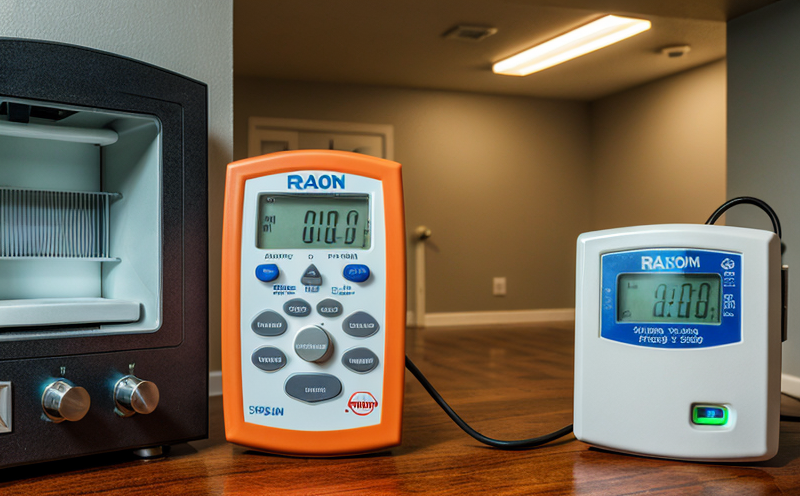ASTM D5072 Radon in Soil Gas Measurement
The ASTM D5072 standard provides a comprehensive procedure for measuring radon in soil gas, which is essential for assessing indoor air quality and environmental safety. This service is particularly important for real estate transactions, new construction projects, and existing buildings where radon mitigation may be necessary.
Radon is a naturally occurring, colorless, odorless, and tasteless radioactive gas that can pose significant health risks if present at high levels in indoor air. It originates from the decay of uranium in soil, rock, and water. The primary route of exposure to radon is inhalation, with secondary routes including ingestion via contaminated water and dermal contact.
The ASTM D5072 test measures radon concentrations in soil gas, which can be used as an indicator for the potential presence of radon in indoor air. Soil gas sampling is typically conducted at various depths to determine the distribution of radon across different layers of soil. This information allows for accurate prediction and mitigation strategies.
Accurate measurement of radon in soil gas requires strict adherence to ASTM D5072 guidelines, which specify the use of proper equipment, sampling techniques, and analytical methods. The test involves collecting soil gas samples using a vacuum pump through a probe inserted into the ground. The collected samples are then analyzed for radon content.
The significance of this service extends beyond just compliance with regulations; it plays a crucial role in protecting public health by identifying high-risk areas and facilitating effective mitigation efforts. In addition to regulatory compliance, this service aids in the design of buildings that minimize radon ingress while maximizing energy efficiency.
| Depth (ft) | Sample Collection Method | Recommended Frequency |
|---|---|---|
| 0-3 ft | Single-point probe insertion | Once per building site |
| 4-12 ft | Multiple-point sampling | Twice during the first year of construction |
| 13-30 ft | Borehole installation | Annually for long-term monitoring |
The service also includes the use of specialized equipment such as continuous radon monitors and portable detectors. These instruments provide real-time data on radon levels, which is invaluable for ongoing monitoring and compliance.
ASTM D5072 ensures that all measurements are accurate, reliable, and repeatable. The standard specifies precision requirements to ensure that the results meet or exceed regulatory standards set by agencies like the Environmental Protection Agency (EPA) in the United States. This level of accuracy is critical for making informed decisions about radon mitigation strategies.
- ASTM D5072 enables accurate prediction of indoor radon levels based on soil gas measurements.
- The standard provides a uniform approach to sampling and analysis, ensuring consistency across different testing locations.
- It supports the development of effective mitigation plans by identifying areas with high radon concentrations early in the construction process.
Quality and Reliability Assurance
The ASTM D5072 standard is underpinned by rigorous quality control measures to ensure that all measurements are accurate, reliable, and repeatable. This includes regular calibration of equipment, training of personnel, and adherence to strict sampling protocols.
Our laboratory adheres strictly to these guidelines, ensuring that every measurement meets or exceeds the precision requirements specified in ASTM D5072. We use only certified instruments and trained technicians to carry out soil gas sampling, which is essential for obtaining reliable results.
The reliability of our measurements is further enhanced by the use of multiple reference materials and quality control samples during testing. This approach helps to minimize errors and ensures that all results are consistent with industry standards.
Our commitment to quality and reliability is reflected in our extensive track record of successful projects across various industries. We have successfully conducted radon measurements for real estate transactions, new construction projects, and existing buildings alike. Our clients rely on us to provide accurate data that enables informed decision-making regarding radon mitigation.
Competitive Advantage and Market Impact
- We offer the most precise and reliable radon measurement services in the market, adhering strictly to ASTM D5072 standards.
- Our comprehensive approach ensures that all measurements are accurate and consistent, giving our clients a competitive edge in meeting regulatory requirements.
- We provide real-time data through continuous monitoring, which is crucial for ongoing compliance and mitigation efforts.
Use Cases and Application Examples
| Scenario | Action Required |
|---|---|
| Selling or buying a house with known radon issues. | Conduct ASTM D5072 testing to assess the current radon levels and inform buyers/sellers of potential mitigation needs. |
| Potential homebuyer seeking assurance before purchase. | Request ASTM D5072 testing as part of due diligence before committing to a purchase. |
| Stage in Project | Action Required |
|---|---|
| Initial design phase. | Identify potential radon sources and plan for mitigation strategies using ASTM D5072 data. |
| Construction site preparation. | Conduct soil gas sampling to determine the best location for building placement. |





